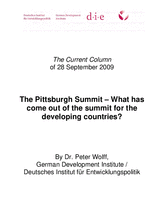The Pittsburgh Summit: what has come out of the summit for the developing countries?
Wolff, PeterThe Current Column (2009)
Bonn: German Development Institute / Deutsches Institut für Entwicklungspolitik (DIE) (The current column of 28 September 2009)
Bonn, 28 September 2009.The third G-20 summit that concluded on Friday in Pittsburgh, at the level of the heads of state and government, has, quite manifestly, established the G-20 as the forum for global economic cooperation. In 2010, still in the shadow of the present crisis, the member countries are set to meet twice, in June in Canada and in November in Korea. From then on, the G-20 will meet regularly once a year, which means in effect that it is set to replace the G-8.
In Pittsburgh the final touches were put on the alterations to the institutional architecture agreed on at the London Summit in April 2009: With the backing of the large developing countries, the international financial institutions (IFIs) are set to be further strengthened on the basis of the additional funds already agreed on for the IMF as well as capital increases for World Bank and regional development banks.
The price the industrialised countries are to pay for the developing country’s assent to efforts to strengthen these institutions so unloved in the South is, at first glance, not very high. The former are to cede a certain percentage share of their voting rights to emerging countries from the developing world: two percent at the IMF and three percent at the World Bank. That will do little to change the fundamental power relations there, and it is likely to be achieved mainly at the expense of a few small European countries. But one thing that is surprising is how quick the developing countries in the G-20 were to buy into the ‘deal’ to strengthen the role of the IFIs. The deal is, be it said, also the only condition under which China, Brazil, and other emerging countries will now be prepared to make additional resources available to the IMF for the purpose of the combating the ongoing crisis, e.g. in eastern Europe. The old North-South discourse – it will now, it seems, soon be a thing of the past.
The perceptive observer will have noticed that the final document (also) shows unmistakable signs of the approach of the Copenhagen climate conference. True, it has nothing to say about binding emissions targets. But it does contain lots of shoptalk about sustainable growth policies. And one thing relevant for the developing countries: it cedes to the World Bank a leading role in climate policy, calling on the G-20 finance ministers to examine, prior to Copenhagen, the options available to fund climate policy, propagating programmes designed to supply the poor with renewable energies, and setting out a commitment on the part of the G-20 countries to cut their subsidies for fossil energies and to replace them with targeted social transfers for the poor. This will prove to be a huge challenge for countries like India and Indonesia that spend large shares of their official budgets for just such subsidies, primarily to the benefit of their urban middle classes.
Thus far the developing countries now represented in the G-20, and in particular China, have of course weathered the crisis relatively well, thanks to their comparatively good pre-crisis economic policies, which gave them they space they needed to deploy stabilising economic stimulus programmes. In doing so, though, they often showed little regard for the interests of poorer and smaller developing countries, opting instead for support programmes designed to promote national economic sectors and putting a whole array of protectionist measures in place to boost domestic growth. All this naturally at the expense of other developing countries that lacked policy space for economic stimulus programmes. This protectionism is assuming the form less of tariffs than of national subsidies and political preference for domestic businesses. The bottom line: most G-20 countries have not honoured the commitment they made at their first summit to refrain from adopting protectionist measures. The aim now must be to reverse this process on the basis of the goal, re-affirmed in Pittsburgh, to bring the Doha Round to a successful conclusion in 2010. It is above all the economic heavyweights among the developing countries that now must be expected to open their markets, at least in favour of poorer developing countries.
The final document of the Pittsburgh Summit repeatedly underlines that one central element of the global path out of the crisis must be more growth in developing countries. It lists a whole array of measures designed to improve, in developing countries, access to food, energy, and financial services as well as to promote growth and prevent major population groups from sinking into poverty. Much of this is not new. It is, however, noteworthy that now, with the G-20, the focus is not only on special crisis-related issues like banker bonuses and financial market regulation, and that development-related issues are now increasingly placed in a global context and discussed at the highest level. The G-8 had, it is true, done much the same thing, e.g. in Gleneagles in 2005, where, with a paternalist gesture, more assistance was pledged for the developing countries. Indeed, the fact that the large developing countries are now directly involved in the decision-making process must certainly be seen as one of the more positive outcomes of the financial crisis.
